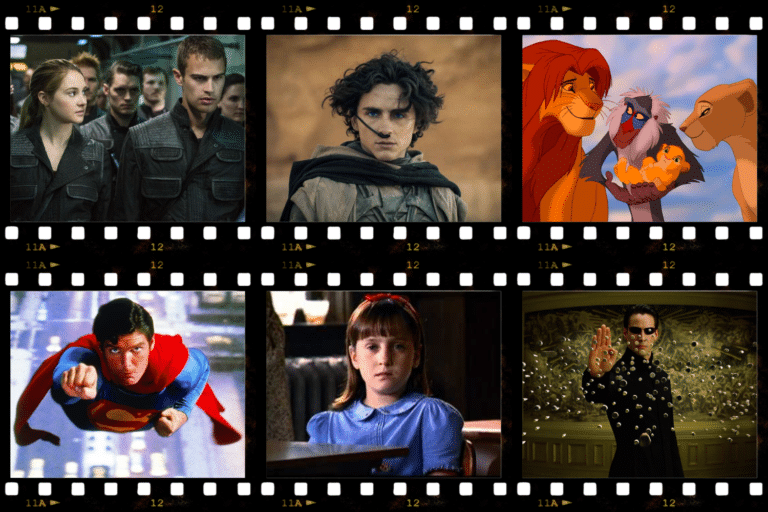
It’s time for one of the best Jewish holidays: Passover! Besides the Seder and the ceremonial feast filled with delicious foods, games, and songs, Passover is also the most cinematic, with the story of Moses and the 10 plagues inspiring beloved films like “The Prince of Egypt” and Cecil B. DeMille’s epic “The Ten Commandments.”
The story is, after all, one of a hero’s journey, with Moses being deemed “the chosen one” to save the Jewish people. The Exodus story even features shocking twists and turns (Death of the firstborn! The splitting of the Red Sea!) which make it a tale worth repeating on film (most recently in 2014, with “Exodus: Gods and Kings” directed by Ridley Scott).
While there are a handful of direct adaptations of the Passover story, what is even more fascinating are how its themes — freedom from oppression, identity, faith, and the rise of an unlikely hero — have seeped into countless other movies across genres. You don’t need splitting seas or burning bushes to feel the resonance of Exodus. Many modern stories mirror Moses’ journey in subtle and surprising ways, whether it’s through a reluctant leader, a desert exile, or a rebellion against tyranny. Others are explicitly fantastical or modern adaptations.
Interested in watching more films inspired by the Passover story that aren’t exact retellings? We’ve got you covered, with several different (albeit non-religious) stories focusing on the theme of the hero’s journey.
- “Gladiator” (2000)
Also directed by Ridley Scott, “Gladiator” tells the story of Maximus (Russell Crowe), a former soldier who fought for the emperor of Rome. But when Maximus returns home, he finds his son and wife were killed and becomes enslaved, with the emperor’s son Commodus (Jewish actor Joaquin Phoenix) taking power. To obtain his freedom, Maximus must fight other gladiators to the death in the Roman colosseum as entertainment. In his journey, he also vows to take back Rome from Commodus.
This fits the Passover story for a few reasons. Firstly, the relationship between Maximus and Commodus is similar to Moses and the Pharaoh, as the emperor treats Maximus like his own son and chooses him to rule after he dies. Secondly, the two “brothers” eventually become sworn enemies, with Maximus fighting for Rome and his fellow enslaved gladiators. Though there aren’t any plagues in this historical drama, it’s still a powerful, yet entertaining film to pregame your Passover Seder.
See viewing options here for “Gladiator.”
- “The Lorax” (2012)
“I am the Lorax, I speak for the trees” sounds a lot like, “I am Adonai. I will free you from the labors of the Egyptians and deliver you from their bondage” (Exodus 6:6-7).
Based on Dr. Suess’ children’s book of the same name, “The Lorax” follows 12-year-old Ted (Jewish actor Zac Efron) who tries to find a real tree to impress his teenage crush Audrey (Taylor Swift). His journey takes him outside of his plastic town run by Mayor O’Hare (Rob Riggle) to find the Once-Ler (Ed Helms), who tells him about the Lorax (Danny DeVito) and where the trees went. From there, Ted attempts to take the town back from O’Hare, who has been selling the air in bottles as a means of earning a profit.
Besides the fact that it’s a musical (the songs “Let My People Go” and “Let it Grow” have a similar ring to it), “The Lorax” is a perfect Passover story because the titular character serves as both a God-like figure and Moses. The Lorax warns the Once-ler not to tear down his trees, and seemingly also has the power to wreak havoc on the town “unless” they make a change. Thankfully, faith is restored in the end, and though we don’t get a parting of the Red Sea, we do get some Exodus-esque imagery when the townspeople come together to stop O’Hare, walking as one.
See viewing options here for “The Lorax.”
- “The Matrix” (1999)
Although on the surface this might not seem like a Passover story, you need to look deeper.
“The Matrix” is a film about saving a world enslaved, where the “chosen one” doesn’t even know it until he liberates his people. Neo (Keanu Reeves) is a hacker whose whole life changes when he “takes the red pill” and discovers that the world he’s been living in is all online, with nothing natural or real. He joins a team that includes hacker Trinity (Carrie-Ann Moss) and Morpheus (Laurence Fishburne), who believes that Neo is “the One” who will free humanity, according to the Oracle (Gloria Foster). Though initially hesitant, Neo soon becomes an asset to the team and proves himself as a skilled hacker and a trained hero.
Like our hero of Exodus, Neo is foreseen by a spiritual figure to be the hero and goes on his own independent path to understand his false reality. But it isn’t until he learns to trust himself, his powers, and the training he has been given that he finally believes he can save the world and others like him. But if you’re still dismayed this film isn’t a Passover movie, perhaps you can take one lesson away from it and put your phone down to be fully present for the Seder this year.
See viewing options here for “The Matrix.”
- “Matilda” (1996)
Also starring (and directed) by Danny DeVito, “Matilda” tells the story of our titular protagonist, a small girl with special powers. Ignored by her parents and ostracized by her brother, Matilda (Jewish actress Mara Wilson) finds joy in reading and is incredibly smart. But when she is enrolled in a new school with a bullying principal named Miss Trunchbull (Pam Ferris), she chooses to use her powers for good and save the students.
Miss Trunchbull is the perfect pharaoh, enslaving the students in a closet called “The Chokey” and ruling over the estate of her ex-husband Magnus, who was supposed to give it to his daughter, teacher Miss Honey (Embeth Davidtz). Throughout the film, Miss Trunchbull is at the mercy of Matilda’s “powers” or “plagues,” including one involving a reptile (like the frogs). But in the end, the students and Matilda reach the promised land (a safe school and a new home).
While the original “Matilda” was written by the known antisemite, Roald Dahl, we can still find value in the film’s messaging against discrimination and oppression.
See viewing options here for “Matilda.”
- “Dune” (2021) and “Dune: Part II” (2024)
Finally, a story that takes place in the desert! Based on the novel by Frank Herbert, “Dune” follows Paul Atreides (Jewish actor Timothée Chalamet) as he attempts to bring peace to the galaxy. When his father, Duke Leto Atreides (Oscar Isaac), is killed after becoming the leader of the desert planet of Arrakis in an act of betrayal by the emperor, Paul and his mother, Lady Jessica (Rebecca Ferguson), go on a journey to save the planet and their precious export — a drug known as spice.
In “Dune: Part II,” Paul becomes a friend to the Fremen, the native people of Arrakis. He and his mother learn their ways, with their leader Stilgar (Javier Bardem) believing him to be the prophesied “Lisan al Gaib,” a messiah who has come to save them. Initially, he humbly denies this, but eventually claims to be the prophet himself, capturing the emperor (Christopher Walken) and inciting a holy war between the Fremen and the rest of the galaxy.
This is a story of religion and belief, but unlike Moses, Paul’s god complex also comes from his training and magical powers. In the end, the Fremen aren’t necessarily free, but they begin to finally protect themselves, their autonomy, and their fate, which is also what happens to the Jews after they escape Pharaoh’s enslavement.
See viewing options here for “Dune.”
- “The Lion King” (1994)
“The Lion King” tells the story of the animal kingdom, where King Mufasa (James Earl Jones) rules peacefully. But when his brother Scar (Jeremy Irons) has him killed, taking his place as king, Mufasa’s son Simba (Jewish actor Matthew Broderick) escapes to the desert, where he is taken under the wing of Timon (Nathan Lane) and Pumbaa (Ernie Sabella). When he becomes an adult lion, he decides to return and fight Scar to end his reign of terror on the animals.
This has every element of Moses’ story, from his privileged childhood to his desert wanderings to even his return and plan to free the rest of his fellow animals and lions. I would even argue it’s the perfect animated double-feature film to pair with “The Prince of Egypt,” complete with a staff and a spiritual vision.
See viewing options here for “The Lion King.”
- “Superman” (1978)
What’s a hero’s journey without a literal superhero? In “Superman,” the titular character (Christopher Reeve) is sent to live on planet Earth by his father Jor-El (Marlon Brando), where he is adopted by Jonathan (Glenn Ford) and Martha Kent (Phyllis Thaxter) and named Clark Kent. After Jonathan’s death, he discovers his true heritage via a hologram by Jor-El and is told not to mess with human history. But when the human race and planet Earth are under attack by evil genius Lex Luther (Gene Hackman), Clark decides to embrace his superhuman identity to fight back and save the world.
Related post: Is Superman Jewish? Here’s why it matters
This is a film about heritage and embracing who you are. Superman is representative of Moses’ Judaism, just as Clark Kent is metaphorically Moses’ other identity, as the Pharaoh’s adopted son. And in his heroic exploits and his choice to step into his real identity, there is an acknowledgement of dayenu: it would have been enough had he just saved the world once, but instead he chose to change time by rescuing Lois Lane (Margot Kidder) too.
Superman, the product of two Jewish first-generation Americans, is filled with Jewish allegories and symbolism. Out of any of the movies on the list, Superman is the only one that explicitly was created in Moses’ image.
See viewing options here for “Superman.”
- “Divergent” (2014)
“Divergent” tells the story of rebellion amid fascism. In future dystopian Chicago, Tris (Shailene Woodley) is tasked with choosing the faction that best fits her, and is expected to choose Abnegation, the selfless who run the government. But during a psychological test, Tris learns she isn’t like the others: she fits into three of the five groups.
This makes her “divergent,” those who don’t fit the exact mold — a group that can think independently, threatening government rule. To blend in, she selects Dauntless as her faction, but discovers that her divergence enables her to avoid mind control techniques led by the Erudite faction, which plans to take over the government. With the help of Four (Theo James), a fellow divergent, they plan to thwart Erudite’s plans, stopping the takeover and freeing the factions.
Besides the obvious theme of embracing one’s identity, the five factions feel similar to the four children of the passover story (the wise, the wicked, the simple, and the child who does not know how to ask). As a Divergent, Tris questions it all and uses her powers to overthrow her government’s “enslavement” or control of others. She is both Miriam and Moses, rebellious but powerful, and using her strength for good.
Originally Published Apr 11, 2025 02:00PM EDT
